北师大版八年级上Unit 1 Television Lesson 2 An Interview on TV同步练习(含答案无听力题)
文档属性
| 名称 | 北师大版八年级上Unit 1 Television Lesson 2 An Interview on TV同步练习(含答案无听力题) |
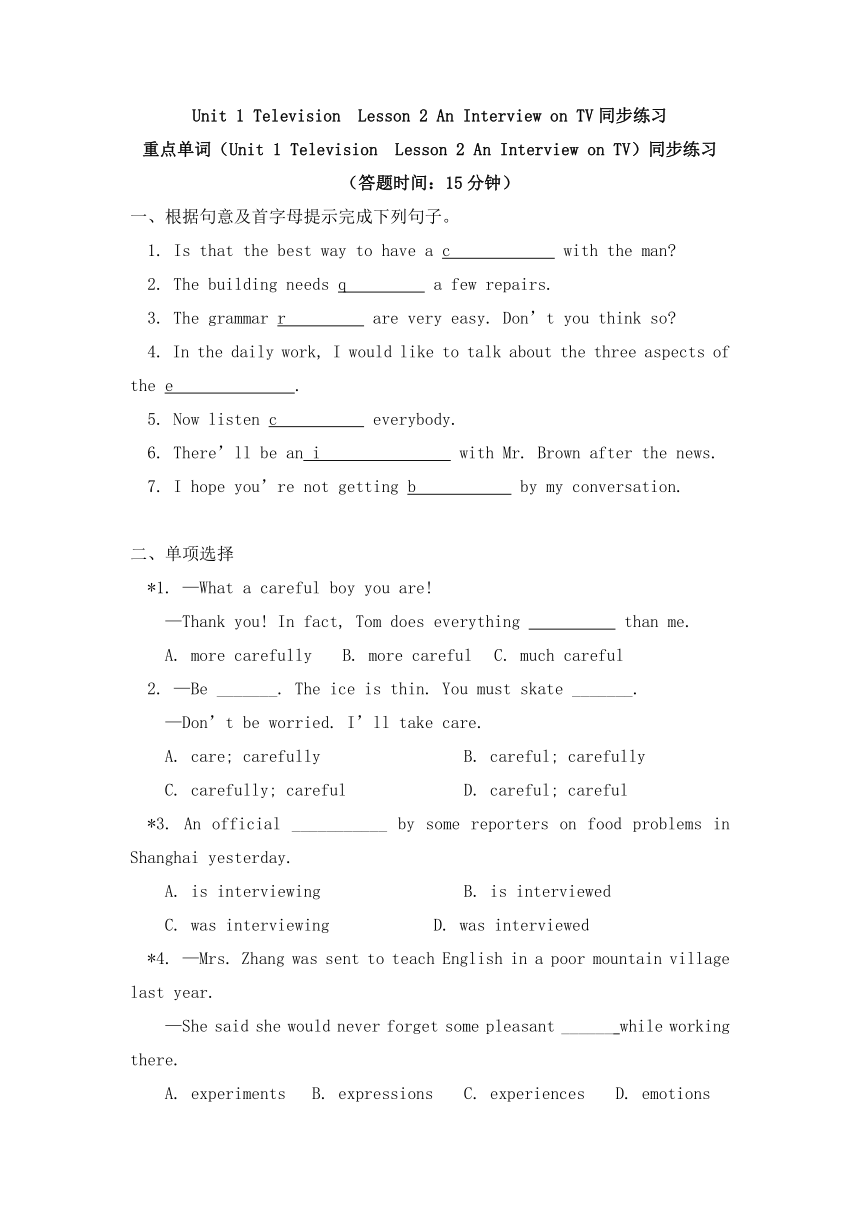
|
|
| 格式 | doc | ||
| 文件大小 | 91.7KB | ||
| 资源类型 | 教案 | ||
| 版本资源 | 北师大版 | ||
| 科目 | 英语 | ||
| 更新时间 | 2020-09-11 00:00:00 | ||
图片预览

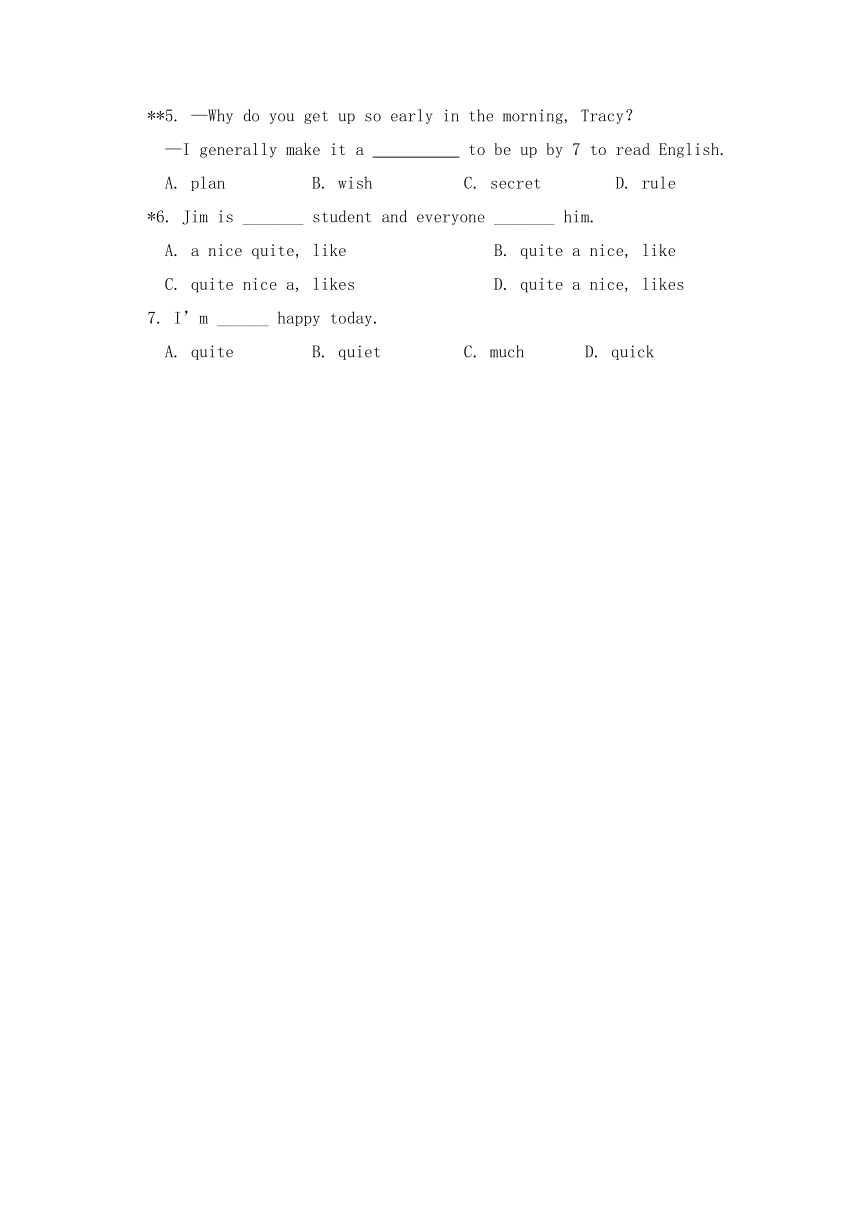
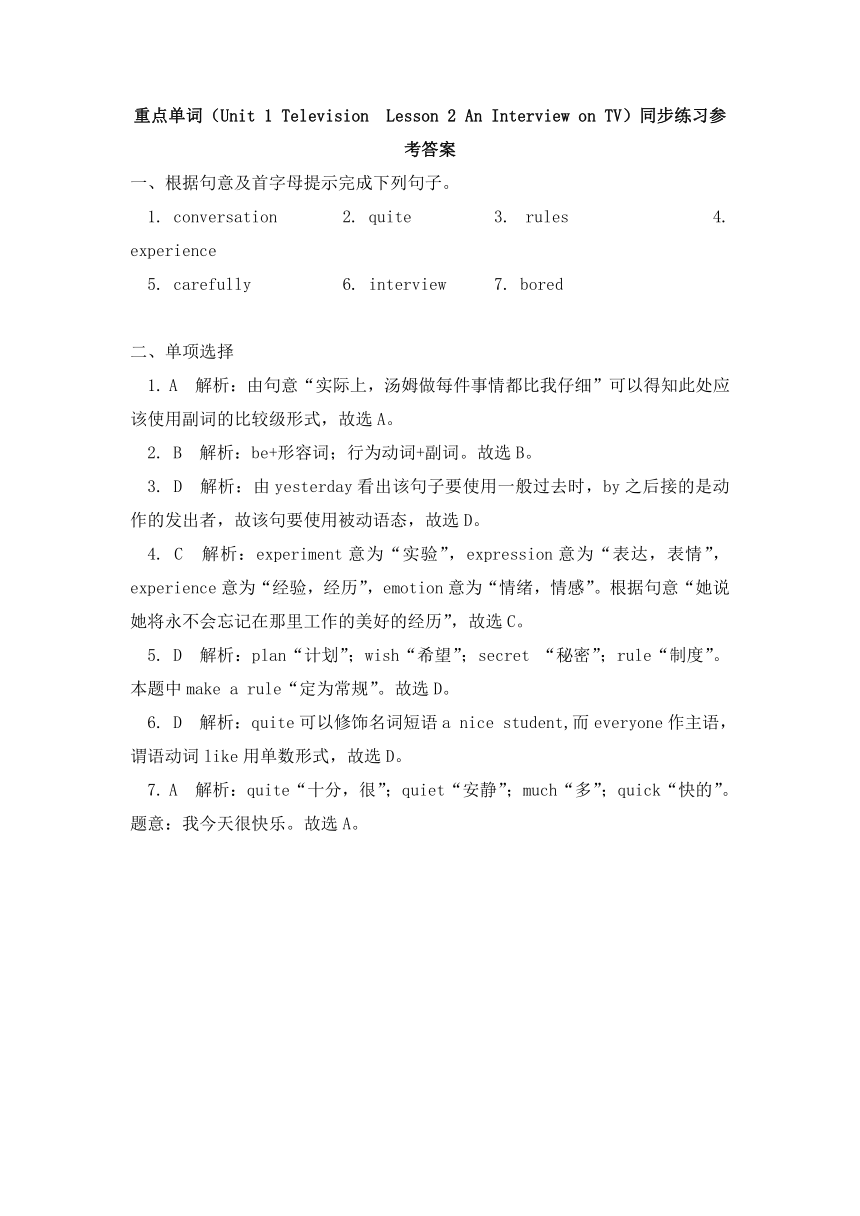
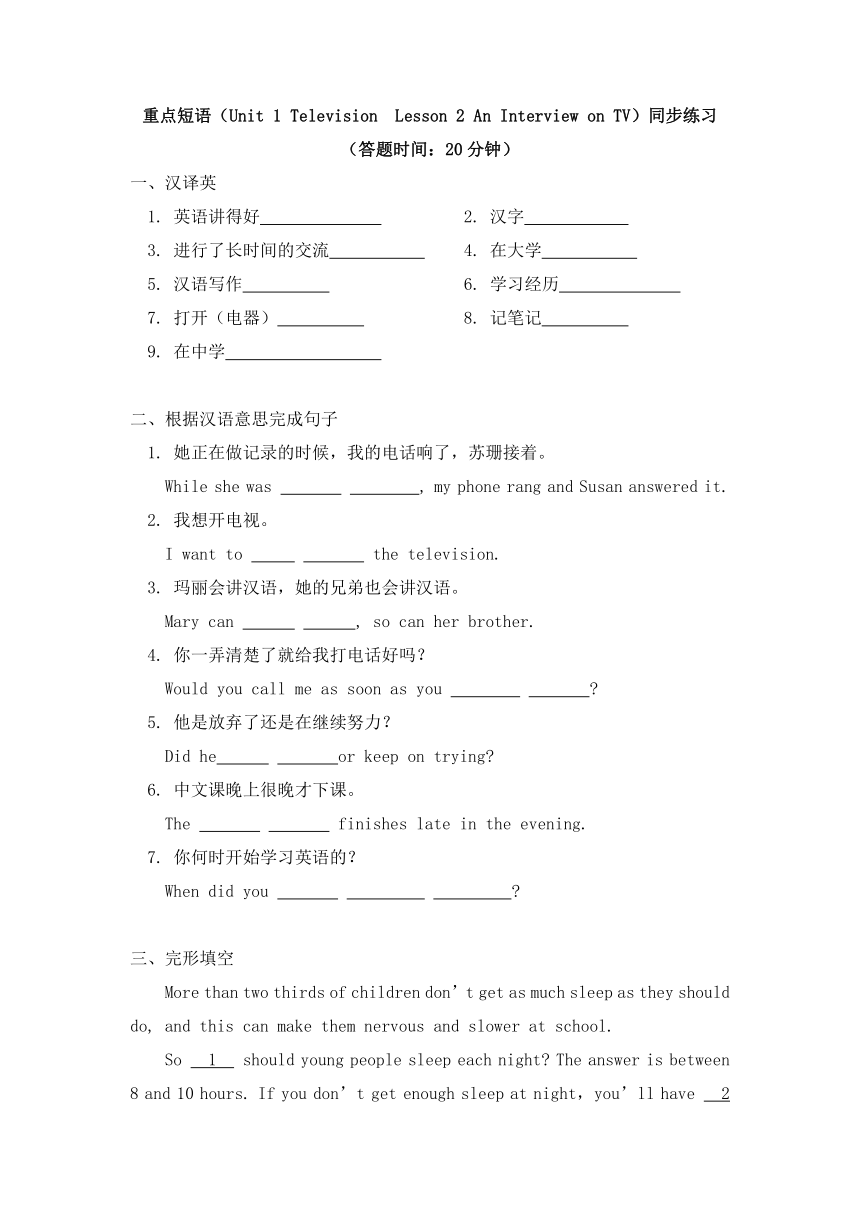
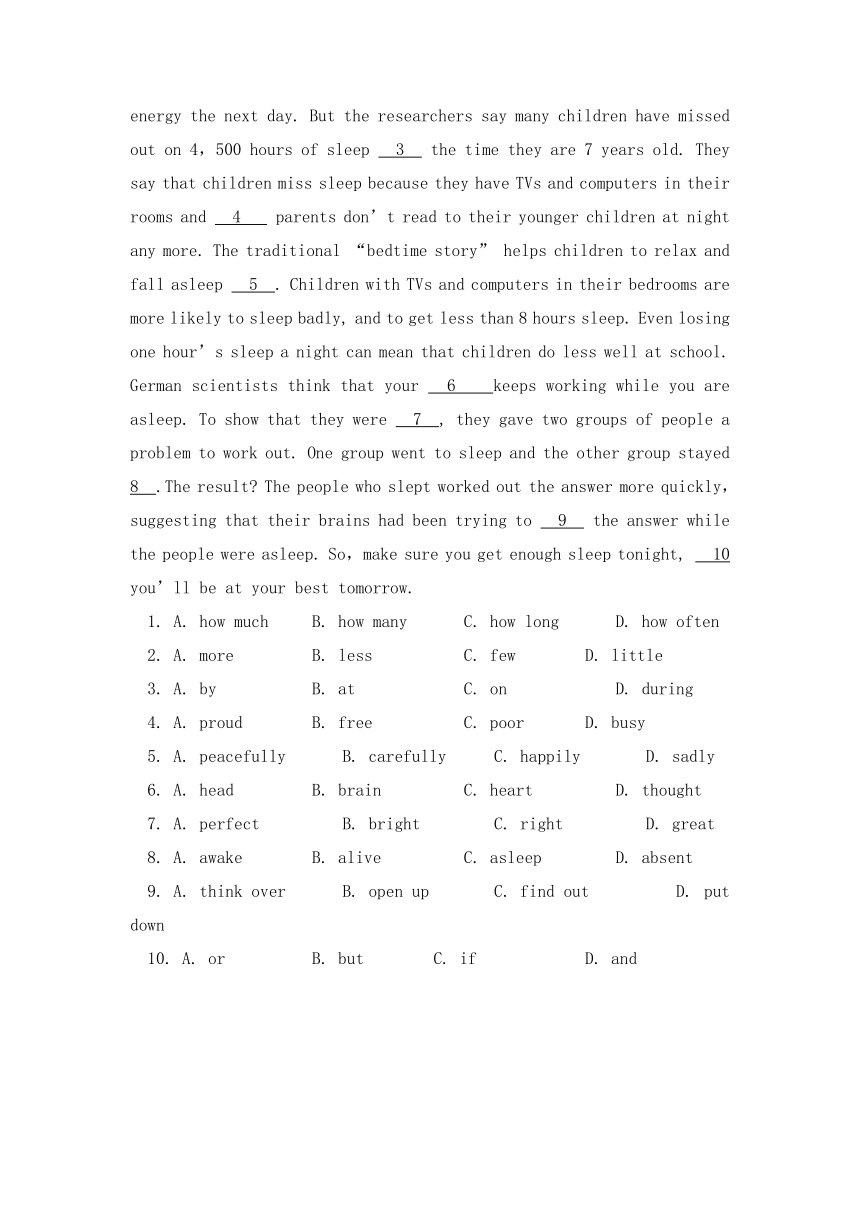
文档简介
Unit 1 Television Lesson 2 An Interview on TV同步练习
重点单词(Unit 1 Television Lesson 2 An Interview on TV)同步练习
(答题时间:15分钟)
一、根据句意及首字母提示完成下列句子。
1. Is that the best way to have a c with the man?
2. The building needs q a few repairs.
3. The grammar r are very easy. Don’t you think so?
4. In the daily work, I would like to talk about the three aspects of the e .
5. Now listen c everybody.
6. There’ll be an i with Mr. Brown after the news.
7. I hope you’re not getting b by my conversation.
二、单项选择
*1. —What a careful boy you are!
—Thank you! In fact, Tom does everything than me.
A. more carefully B. more careful C. much careful
2. —Be _______. The ice is thin. You must skate _______.
—Don’t be worried. I’ll take care.
A. care; carefully B. careful; carefully
C. carefully; careful D. careful; careful
*3. An official ___________ by some reporters on food problems in Shanghai yesterday.
A. is interviewing B. is interviewed
C. was interviewing D. was interviewed
*4. —Mrs. Zhang was sent to teach English in a poor mountain village last year.
—She said she would never forget some pleasant ______ while working there.
A. experiments B. expressions C. experiences D. emotions
**5. —Why do you get up so early in the morning, Tracy?
—I generally make it a to be up by 7 to read English.
A. plan B. wish C. secret D. rule
*6. Jim is _______ student and everyone _______ him.
A. a nice quite, like B. quite a nice, like
C. quite nice a, likes D. quite a nice, likes
7. I’m ______ happy today.
A. quite B. quiet C. much D. quick
重点单词(Unit 1 Television Lesson 2 An Interview on TV)同步练习参考答案
一、根据句意及首字母提示完成下列句子。
1. conversation 2. quite 3. rules 4. experience
5. carefully 6. interview 7. bored
二、单项选择
1. A 解析:由句意“实际上,汤姆做每件事情都比我仔细”可以得知此处应该使用副词的比较级形式,故选A。
2. B 解析:be+形容词;行为动词+副词。故选B。
3. D 解析:由yesterday看出该句子要使用一般过去时,by之后接的是动作的发出者,故该句要使用被动语态,故选D。
4. C 解析:experiment意为“实验”,expression意为“表达,表情”,experience意为“经验,经历”,emotion意为“情绪,情感”。根据句意“她说她将永不会忘记在那里工作的美好的经历”,故选C。
5. D 解析:plan“计划”;wish“希望”;secret “秘密”;rule“制度”。本题中make a rule“定为常规”。故选D。
6. D 解析:quite可以修饰名词短语a nice student,而everyone作主语,谓语动词like用单数形式,故选D。
7. A 解析:quite“十分,很”;quiet“安静”;much“多”;quick“快的”。题意:我今天很快乐。故选A。
重点短语(Unit 1 Television Lesson 2 An Interview on TV)同步练习
(答题时间:20分钟)
一、汉译英
1. 英语讲得好 2. 汉字
3. 进行了长时间的交流 4. 在大学
5. 汉语写作 6. 学习经历
7. 打开(电器) 8. 记笔记
9. 在中学
二、根据汉语意思完成句子
1. 她正在做记录的时候,我的电话响了,苏珊接着。
While she was , my phone rang and Susan answered it.
2. 我想开电视。
I want to the television.
3. 玛丽会讲汉语,她的兄弟也会讲汉语。
Mary can , so can her brother.
4. 你一弄清楚了就给我打电话好吗?
Would you call me as soon as you ?
5. 他是放弃了还是在继续努力?
Did he or keep on trying?
6. 中文课晚上很晚才下课。
The finishes late in the evening.
7. 你何时开始学习英语的?
When did you ?
三、完形填空
More than two thirds of children don’t get as much sleep as they should do, and this can make them nervous and slower at school.
So 1 should young people sleep each night? The answer is between 8 and 10 hours. If you don’t get enough sleep at night,you’ll have 2 energy the next day. But the researchers say many children have missed out on 4,500 hours of sleep 3 the time they are 7 years old. They say that children miss sleep because they have TVs and computers in their rooms and 4 parents don’t read to their younger children at night any more. The traditional “bedtime story” helps children to relax and fall asleep 5 . Children with TVs and computers in their bedrooms are more likely to sleep badly, and to get less than 8 hours sleep. Even losing one hour’s sleep a night can mean that children do less well at school. German scientists think that your 6 keeps working while you are asleep. To show that they were 7 , they gave two groups of people a problem to work out. One group went to sleep and the other group stayed 8 .The result? The people who slept worked out the answer more quickly,suggesting that their brains had been trying to 9 the answer while the people were asleep. So,make sure you get enough sleep tonight, 10 you’ll be at your best tomorrow.
1. A. how much B. how many C. how long D. how often
2. A. more B. less C. few D. little
3. A. by B. at C. on D. during
4. A. proud B. free C. poor D. busy
5. A. peacefully B. carefully C. happily D. sadly
6. A. head B. brain C. heart D. thought
7. A. perfect B. bright C. right D. great
8. A. awake B. alive C. asleep D. absent
9. A. think over B. open up C. find out D. put down
10. A. or B. but C. if D. and
重点短语(Unit 1 Television Lesson 2 An Interview on TV)同步练习参考答案
一、汉译英
1. speak English very well 2. Chinese characters 3. have a long conversation
4. at university 5. Chinese writing 6. learning experience
7. turn on 8. take notes 9. in high school
二、根据汉语意思完成句子
1. taking notes;2. turn on;3. speak Chinese;4. find out;5. give up;6. Chinese class;7. begin learning English
三、完形填空
1. C 解析:how much 修饰或代替不可数名词,本句中提问的是睡觉的“量”,故选C。
2. B 解析:上句“没有充足的睡眠”提示下句用little的比较级修饰不可数名词energy,表示“更少的精力”。
3. A 解析:介词短语by the time 表示“截止到……时候,到……时候为止”,符合句意“到7岁为止”。
4. D 解析:后句“不再在晚上给孩子们讲故事”说明是“繁忙的父母们”,用形容词busy表达“繁忙的”,故选D。
5. A 解析:前文“放松的”说明下文意为“平和地,平静地”,用副词peacefully 修饰动词短语fall asleep。
6. B 解析:通过下文suggesting that their brains had been trying to…判定句意为“大脑仍在工作”。
7. C 解析:下文的实验说明本句意为“为了证明他们是正确的”,right表示“正确的,对的”。
8. A 解析:前句“一组睡觉”说明后面一组是“醒着”,在系动词stay后用形容词awake表示“醒着的”。
9. C 解析:find out 表示“搞清楚,弄明白”和answer 构成动宾关系,表示“搞清答案”。
10. D 解析:and是并列连词,表示顺承关系。
重点句型(Unit 1 Television Lesson 2 An Interview on TV)同步练习
(答题时间:20分钟)
一、按要求完成下面的句子,每空一词。
1. These flowers are very beautiful. (改为感叹句)
_______ _______ these flowers are!
2. The little boy is very clever. (改为感叹句)
_______ _______ the little boy is!
3. It’s a funny story. (改为感叹句)
_______ _______ _______ story it is!
4. What a good girl she is! (改为同义句)
_______ _______ _______ girl she is!
5. How delicious the food is! (改为同义句)
_______ _______ food it is!
6. They are running fast. (改为感叹句)
_______ _______ they are running!
7. Her sister is a very lovely girl. (改为感叹句)
_______ _______ lovely girl her sister is!
_______ _______ her sister is!
8. I have read a very interesting book. (改为感叹句)
_______ _______ _______ book I have read!
9. Your dictionary is very useful. (改为感叹句)
_______ _______ your dictionary is!
10. The children are singing and dancing happily. (改为感叹句)
_______ _______ the children are singing and dancing!
二、连词成句
1. health, is, for, milk, your, drinking, good.
2. fat, you, too, much, eating, make, may.
3. for, in, sun, reading, your, the, eyes, is, bad.
4. exercise, good, walking, is.
5. to, by, bus, ten, me, going, minutes, school, usually, takes.
三、阅读理解
A
This is a talk by a London taxi(出租车)driver.
“I’ve been a taxi driver for nearly ten years. Most London taxi drivers have their own taxis.”
“It’s a nice job and most of time you meet a lot of people. I always work at night, because there is too much traffic during the day. I live twenty miles(英里)outside London and I go to work at 5:30 in the afternoon.”
“I usually go home between 2 and 3 in the morning.”
“Some very strange things happened late at night. The other day I was taking a woman home from a party .She had her little dog with her. When we got to her house, she found that she had lost her key. So I waited in the car with the dog while she climbed in through the windows.”
“I waited and waited. After half an hour of ringing the bell, I decided to find out what was going on. I tied the dog to a tree and started to climb in through the window. The next thing I knew was that the police came. They thought I was a thief(小偷).
Luckily the woman came downstairs(下楼). She must have gone to sleep and forgotten about me and the dog!”
1. The driver always worked at night because it was easier to _____.
A. drive B. make money
C. climb in through the window D. meet a lot of people
2. The woman climbed in through the window because _____.
A. she wanted to have a sleep
B. her husband didn’t open the door for her
C. she didn’t want to pay the driver
D. she couldn’t find her key
3. The story happened _____.
A. early in the morning B. late at night
C.20 miles outside London D. near the police station
4. Which of the following is wrong?
A. The driver worked until between 2 and 3 in the morning.
B. The police made a mistake.
C. The woman had no money to pay the driver.
D. The woman had forgotten about the driver and the dog.
5. The driver climbed in through the window to .
A. get money from the woman
B. return the dog to the woman
C. see what was happening in the house
D. phone the police
B
When my family moved to America in 2010 from a small village in Guangdong, China, we brought not only our luggage, but also our village rules, customs and culture. One of the rules is that young people should always respect(尊敬) elders. Unluckily, this rule led to my very first embarrassment in the United States.
I had a part-time job as a waiter in a Chinese restaurant. One time, when I was serving food to a middle-aged couple, the wife asked me how the food could be served so quickly. I told her that I had made sure they got their food quickly because I always respect the elderly. As soon as I said that, her face showed great displeasure. My manager, who happened to hear what I said, took me aside and gave me a long lecture about how sensitive(敏感) Americans are and how they dislike the description “old”. I then walked back to the table and apologized to the wife. After the couple heard my reason, they understood that the problem was caused by cultural differences, so they laughed and were no longer angry.
In my village in China, people are proud of being old. Not so many people live to be seventy or eighty, and people who reach such an age have the most knowledge and experience. Young people always respect older people because they know they can learn from their rich experience.
However, in the United States, people think “growing old” is a problem since “old” shows that a person is going to retire or that the body is not working well. Here many people try to keep themselves away from growing old by doing exercises or jogging, and women put on makeup, hoping to look young. When I told the couple in the restaurant that I respect the elderly, they got angry because this caused them to feel they had failed to stay young. I had told them something they didn’t want to hear.
After that, I changed the way I had been with older people. It is not that I don’t respect them any more; I still respect them, but now I don’t show my feelings through words.
By Jack.
1. Jack brought the couple their food very fast because _______.
A. the manager asked him to do so
B. he respected the elderly
C. the couple wanted him to do so
D. he wanted more pay
2. When Jack called the couple “elderly”, they became _______.
A. nervous B. satisfied C. unhappy D. excited
3. In Jack’s hometown, _______.
A. people dislike being called “old”
B. people are proud of being old
C. many people reach the age of seventy or eighty
D. the elderly are the first to get food in restaurants
4. After this experience, Jack _______.
A. lost his job in the restaurant
B. made friends with the couple
C. no longer respected the elderly
D. changed his way with older people
5. Which of the following is TRUE?
A. The more Jack explained, the angrier the couple got.
B. Jack wanted to show his feelings through words after his experience.
C. The manager went back to the table and apologized to the couple.
D. From this experience, Jack learned more about American culture.
重点句型(Unit 1 Television Lesson 2 An Interview on TV)同步练习参考答案
一、按要求完成下面的句子,每空一词。
1. How beautiful 2. How clever 3. What a funny 4. How good a
5. What delicious 6. How fast 7. What a; How lovely 8. What an interesting
9. How useful 10. How happily
二、连词成句
1. Drinking milk is good for your health.
2. Eating too much may make you fat.
3. Reading in the sun is bad for your eyes.
4. Walking is good exercise.
5. Going to school by bus usually takes me ten minutes.
三、阅读理解
A
1. A 解析:由“I always work at night, because there is too much traffic during the day.”,可知选A。
2. D 解析:由“When we got to her house, she found that she had lost her key. So I waited in the car with the dog while she climbed in through the windows.”,可知选D。
3. B 解析:由“Some very strange things happened late at night”,可知选B。
4. C 解析:由“When we got to her house, she found that she had lost her key. So I waited in the car with the dog while she climbed in through the windows.”,可知选C。
5. C 解析:由“I decided to find out what was going on.”,可知选C。
B
1. B 解析:根据第2段中的I told her that I had made sure they got their food quickly because I always respect the elderly可知答案。
2. C 解析:根据第2段中的As soon as I said that, her face showed great displeasure可知他们听到Jack称他们为老者时,一点也不高兴。
3. B 解析:根据第3段中的In my village in China, people are proud of being old可知答案。
4. D 解析:根据最后一段中的After that, I changed the way I had been with older people可知答案。
5. D 解析:根据第2段最后一句After the couple heard my reason, they understood that the problem was caused by cultural differences, so they laughed and were no longer angry可知A选项不对;根据文章最后一句but now I don’t show my feelings through words可知B选项不对;根据第2段中的I then waked back to the table and apologized to the wife 可知C 选项也不对,故正确答案为D。
重点单词(Unit 1 Television Lesson 2 An Interview on TV)同步练习
(答题时间:15分钟)
一、根据句意及首字母提示完成下列句子。
1. Is that the best way to have a c with the man?
2. The building needs q a few repairs.
3. The grammar r are very easy. Don’t you think so?
4. In the daily work, I would like to talk about the three aspects of the e .
5. Now listen c everybody.
6. There’ll be an i with Mr. Brown after the news.
7. I hope you’re not getting b by my conversation.
二、单项选择
*1. —What a careful boy you are!
—Thank you! In fact, Tom does everything than me.
A. more carefully B. more careful C. much careful
2. —Be _______. The ice is thin. You must skate _______.
—Don’t be worried. I’ll take care.
A. care; carefully B. careful; carefully
C. carefully; careful D. careful; careful
*3. An official ___________ by some reporters on food problems in Shanghai yesterday.
A. is interviewing B. is interviewed
C. was interviewing D. was interviewed
*4. —Mrs. Zhang was sent to teach English in a poor mountain village last year.
—She said she would never forget some pleasant ______ while working there.
A. experiments B. expressions C. experiences D. emotions
**5. —Why do you get up so early in the morning, Tracy?
—I generally make it a to be up by 7 to read English.
A. plan B. wish C. secret D. rule
*6. Jim is _______ student and everyone _______ him.
A. a nice quite, like B. quite a nice, like
C. quite nice a, likes D. quite a nice, likes
7. I’m ______ happy today.
A. quite B. quiet C. much D. quick
重点单词(Unit 1 Television Lesson 2 An Interview on TV)同步练习参考答案
一、根据句意及首字母提示完成下列句子。
1. conversation 2. quite 3. rules 4. experience
5. carefully 6. interview 7. bored
二、单项选择
1. A 解析:由句意“实际上,汤姆做每件事情都比我仔细”可以得知此处应该使用副词的比较级形式,故选A。
2. B 解析:be+形容词;行为动词+副词。故选B。
3. D 解析:由yesterday看出该句子要使用一般过去时,by之后接的是动作的发出者,故该句要使用被动语态,故选D。
4. C 解析:experiment意为“实验”,expression意为“表达,表情”,experience意为“经验,经历”,emotion意为“情绪,情感”。根据句意“她说她将永不会忘记在那里工作的美好的经历”,故选C。
5. D 解析:plan“计划”;wish“希望”;secret “秘密”;rule“制度”。本题中make a rule“定为常规”。故选D。
6. D 解析:quite可以修饰名词短语a nice student,而everyone作主语,谓语动词like用单数形式,故选D。
7. A 解析:quite“十分,很”;quiet“安静”;much“多”;quick“快的”。题意:我今天很快乐。故选A。
重点短语(Unit 1 Television Lesson 2 An Interview on TV)同步练习
(答题时间:20分钟)
一、汉译英
1. 英语讲得好 2. 汉字
3. 进行了长时间的交流 4. 在大学
5. 汉语写作 6. 学习经历
7. 打开(电器) 8. 记笔记
9. 在中学
二、根据汉语意思完成句子
1. 她正在做记录的时候,我的电话响了,苏珊接着。
While she was , my phone rang and Susan answered it.
2. 我想开电视。
I want to the television.
3. 玛丽会讲汉语,她的兄弟也会讲汉语。
Mary can , so can her brother.
4. 你一弄清楚了就给我打电话好吗?
Would you call me as soon as you ?
5. 他是放弃了还是在继续努力?
Did he or keep on trying?
6. 中文课晚上很晚才下课。
The finishes late in the evening.
7. 你何时开始学习英语的?
When did you ?
三、完形填空
More than two thirds of children don’t get as much sleep as they should do, and this can make them nervous and slower at school.
So 1 should young people sleep each night? The answer is between 8 and 10 hours. If you don’t get enough sleep at night,you’ll have 2 energy the next day. But the researchers say many children have missed out on 4,500 hours of sleep 3 the time they are 7 years old. They say that children miss sleep because they have TVs and computers in their rooms and 4 parents don’t read to their younger children at night any more. The traditional “bedtime story” helps children to relax and fall asleep 5 . Children with TVs and computers in their bedrooms are more likely to sleep badly, and to get less than 8 hours sleep. Even losing one hour’s sleep a night can mean that children do less well at school. German scientists think that your 6 keeps working while you are asleep. To show that they were 7 , they gave two groups of people a problem to work out. One group went to sleep and the other group stayed 8 .The result? The people who slept worked out the answer more quickly,suggesting that their brains had been trying to 9 the answer while the people were asleep. So,make sure you get enough sleep tonight, 10 you’ll be at your best tomorrow.
1. A. how much B. how many C. how long D. how often
2. A. more B. less C. few D. little
3. A. by B. at C. on D. during
4. A. proud B. free C. poor D. busy
5. A. peacefully B. carefully C. happily D. sadly
6. A. head B. brain C. heart D. thought
7. A. perfect B. bright C. right D. great
8. A. awake B. alive C. asleep D. absent
9. A. think over B. open up C. find out D. put down
10. A. or B. but C. if D. and
重点短语(Unit 1 Television Lesson 2 An Interview on TV)同步练习参考答案
一、汉译英
1. speak English very well 2. Chinese characters 3. have a long conversation
4. at university 5. Chinese writing 6. learning experience
7. turn on 8. take notes 9. in high school
二、根据汉语意思完成句子
1. taking notes;2. turn on;3. speak Chinese;4. find out;5. give up;6. Chinese class;7. begin learning English
三、完形填空
1. C 解析:how much 修饰或代替不可数名词,本句中提问的是睡觉的“量”,故选C。
2. B 解析:上句“没有充足的睡眠”提示下句用little的比较级修饰不可数名词energy,表示“更少的精力”。
3. A 解析:介词短语by the time 表示“截止到……时候,到……时候为止”,符合句意“到7岁为止”。
4. D 解析:后句“不再在晚上给孩子们讲故事”说明是“繁忙的父母们”,用形容词busy表达“繁忙的”,故选D。
5. A 解析:前文“放松的”说明下文意为“平和地,平静地”,用副词peacefully 修饰动词短语fall asleep。
6. B 解析:通过下文suggesting that their brains had been trying to…判定句意为“大脑仍在工作”。
7. C 解析:下文的实验说明本句意为“为了证明他们是正确的”,right表示“正确的,对的”。
8. A 解析:前句“一组睡觉”说明后面一组是“醒着”,在系动词stay后用形容词awake表示“醒着的”。
9. C 解析:find out 表示“搞清楚,弄明白”和answer 构成动宾关系,表示“搞清答案”。
10. D 解析:and是并列连词,表示顺承关系。
重点句型(Unit 1 Television Lesson 2 An Interview on TV)同步练习
(答题时间:20分钟)
一、按要求完成下面的句子,每空一词。
1. These flowers are very beautiful. (改为感叹句)
_______ _______ these flowers are!
2. The little boy is very clever. (改为感叹句)
_______ _______ the little boy is!
3. It’s a funny story. (改为感叹句)
_______ _______ _______ story it is!
4. What a good girl she is! (改为同义句)
_______ _______ _______ girl she is!
5. How delicious the food is! (改为同义句)
_______ _______ food it is!
6. They are running fast. (改为感叹句)
_______ _______ they are running!
7. Her sister is a very lovely girl. (改为感叹句)
_______ _______ lovely girl her sister is!
_______ _______ her sister is!
8. I have read a very interesting book. (改为感叹句)
_______ _______ _______ book I have read!
9. Your dictionary is very useful. (改为感叹句)
_______ _______ your dictionary is!
10. The children are singing and dancing happily. (改为感叹句)
_______ _______ the children are singing and dancing!
二、连词成句
1. health, is, for, milk, your, drinking, good.
2. fat, you, too, much, eating, make, may.
3. for, in, sun, reading, your, the, eyes, is, bad.
4. exercise, good, walking, is.
5. to, by, bus, ten, me, going, minutes, school, usually, takes.
三、阅读理解
A
This is a talk by a London taxi(出租车)driver.
“I’ve been a taxi driver for nearly ten years. Most London taxi drivers have their own taxis.”
“It’s a nice job and most of time you meet a lot of people. I always work at night, because there is too much traffic during the day. I live twenty miles(英里)outside London and I go to work at 5:30 in the afternoon.”
“I usually go home between 2 and 3 in the morning.”
“Some very strange things happened late at night. The other day I was taking a woman home from a party .She had her little dog with her. When we got to her house, she found that she had lost her key. So I waited in the car with the dog while she climbed in through the windows.”
“I waited and waited. After half an hour of ringing the bell, I decided to find out what was going on. I tied the dog to a tree and started to climb in through the window. The next thing I knew was that the police came. They thought I was a thief(小偷).
Luckily the woman came downstairs(下楼). She must have gone to sleep and forgotten about me and the dog!”
1. The driver always worked at night because it was easier to _____.
A. drive B. make money
C. climb in through the window D. meet a lot of people
2. The woman climbed in through the window because _____.
A. she wanted to have a sleep
B. her husband didn’t open the door for her
C. she didn’t want to pay the driver
D. she couldn’t find her key
3. The story happened _____.
A. early in the morning B. late at night
C.20 miles outside London D. near the police station
4. Which of the following is wrong?
A. The driver worked until between 2 and 3 in the morning.
B. The police made a mistake.
C. The woman had no money to pay the driver.
D. The woman had forgotten about the driver and the dog.
5. The driver climbed in through the window to .
A. get money from the woman
B. return the dog to the woman
C. see what was happening in the house
D. phone the police
B
When my family moved to America in 2010 from a small village in Guangdong, China, we brought not only our luggage, but also our village rules, customs and culture. One of the rules is that young people should always respect(尊敬) elders. Unluckily, this rule led to my very first embarrassment in the United States.
I had a part-time job as a waiter in a Chinese restaurant. One time, when I was serving food to a middle-aged couple, the wife asked me how the food could be served so quickly. I told her that I had made sure they got their food quickly because I always respect the elderly. As soon as I said that, her face showed great displeasure. My manager, who happened to hear what I said, took me aside and gave me a long lecture about how sensitive(敏感) Americans are and how they dislike the description “old”. I then walked back to the table and apologized to the wife. After the couple heard my reason, they understood that the problem was caused by cultural differences, so they laughed and were no longer angry.
In my village in China, people are proud of being old. Not so many people live to be seventy or eighty, and people who reach such an age have the most knowledge and experience. Young people always respect older people because they know they can learn from their rich experience.
However, in the United States, people think “growing old” is a problem since “old” shows that a person is going to retire or that the body is not working well. Here many people try to keep themselves away from growing old by doing exercises or jogging, and women put on makeup, hoping to look young. When I told the couple in the restaurant that I respect the elderly, they got angry because this caused them to feel they had failed to stay young. I had told them something they didn’t want to hear.
After that, I changed the way I had been with older people. It is not that I don’t respect them any more; I still respect them, but now I don’t show my feelings through words.
By Jack.
1. Jack brought the couple their food very fast because _______.
A. the manager asked him to do so
B. he respected the elderly
C. the couple wanted him to do so
D. he wanted more pay
2. When Jack called the couple “elderly”, they became _______.
A. nervous B. satisfied C. unhappy D. excited
3. In Jack’s hometown, _______.
A. people dislike being called “old”
B. people are proud of being old
C. many people reach the age of seventy or eighty
D. the elderly are the first to get food in restaurants
4. After this experience, Jack _______.
A. lost his job in the restaurant
B. made friends with the couple
C. no longer respected the elderly
D. changed his way with older people
5. Which of the following is TRUE?
A. The more Jack explained, the angrier the couple got.
B. Jack wanted to show his feelings through words after his experience.
C. The manager went back to the table and apologized to the couple.
D. From this experience, Jack learned more about American culture.
重点句型(Unit 1 Television Lesson 2 An Interview on TV)同步练习参考答案
一、按要求完成下面的句子,每空一词。
1. How beautiful 2. How clever 3. What a funny 4. How good a
5. What delicious 6. How fast 7. What a; How lovely 8. What an interesting
9. How useful 10. How happily
二、连词成句
1. Drinking milk is good for your health.
2. Eating too much may make you fat.
3. Reading in the sun is bad for your eyes.
4. Walking is good exercise.
5. Going to school by bus usually takes me ten minutes.
三、阅读理解
A
1. A 解析:由“I always work at night, because there is too much traffic during the day.”,可知选A。
2. D 解析:由“When we got to her house, she found that she had lost her key. So I waited in the car with the dog while she climbed in through the windows.”,可知选D。
3. B 解析:由“Some very strange things happened late at night”,可知选B。
4. C 解析:由“When we got to her house, she found that she had lost her key. So I waited in the car with the dog while she climbed in through the windows.”,可知选C。
5. C 解析:由“I decided to find out what was going on.”,可知选C。
B
1. B 解析:根据第2段中的I told her that I had made sure they got their food quickly because I always respect the elderly可知答案。
2. C 解析:根据第2段中的As soon as I said that, her face showed great displeasure可知他们听到Jack称他们为老者时,一点也不高兴。
3. B 解析:根据第3段中的In my village in China, people are proud of being old可知答案。
4. D 解析:根据最后一段中的After that, I changed the way I had been with older people可知答案。
5. D 解析:根据第2段最后一句After the couple heard my reason, they understood that the problem was caused by cultural differences, so they laughed and were no longer angry可知A选项不对;根据文章最后一句but now I don’t show my feelings through words可知B选项不对;根据第2段中的I then waked back to the table and apologized to the wife 可知C 选项也不对,故正确答案为D。
同课章节目录
- Unit 1 Television
- Lesson 1 Last Week on TV
- Lesson 2 An Interview on TV
- Lesson 3 The Big Game
- Communication Workshop
- Unit 2 Teams
- Lesson 4 Class Projects
- Lesson 5 Teamwork
- Lesson 6 A Special Team
- Communication Workshop
- Unit 3 Faster,Higher,Stronge
- Lesson 7 Time to Exercise
- Lesson 8 Olympic Winners
- Lesson 9 Never Give Up!
- Communication Workshop
- Unit 4 Healthy Living
- Lesson 10 Going to the Doctor
- Lesson 11 Health Advice
- Lesson 12 Healthy Bones
- Communication Workshop
- Unit 5 Helping
- Lesson 13 Helping Your Community
- Lesson 14 Helping Each Other
- Lesson 15 A Young Hero
- Communication Workshop
- Unit 6 The Unexplained
- Lesson 16 Natural Abilities
- Lesson 17 True Stories?
- Lesson 18 Dreams
- Communication Workshop
